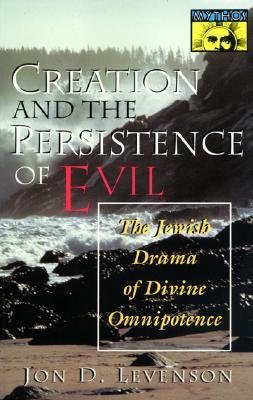Book Review: Creation and the Persistence of Evil
Creation and the Persistence of Evil:
The Jewish Drama of Divine Omnipotence
by Jon Douglas Levenson
Review by Ben Tameling
In Creation and the Persistence of Evil, Jewish scholar Levenson articulates a Hebrew response to the problem of evil. He sets his argument in opposition to the theodicies of Christians who adopt either classical theology or modern process theology that entails a limited God. For the Israelites, God is clearly omnipotent, so the limited God view must be rejected. However, his omnipotence is not a “static attribute,” as is in classical theology, but rather a “dramatic enactment.” This type of creation theology is expressed throughout the Hebrew Bible as the Israelites attempt to “goad God into reactivating his primal omnipotence, which is never relinquished but often agonizingly, catastrophically dormant.” Levenson states, “the overwhelming tendency of biblical writers as they confront undeserved evil is not to explain it away but to call upon God to blast it away.”
God’s creation of the world results from his victory over the forces of evil and chaos. Old Testament faith consists of calling God to remember that first act and to show his power and mastery over creation in the present where the “persistence of evil” is not yet fully vanquished. Levenson carries forward this thesis in three separate parts of his book.
First, he explores the theme of God’s defeat of the chaos monsters like Leviathan, making fascinating comparisons to other ancient Near Eastern “cosmic battle” stories to illustrate similarities and differences. He argues that while other mythic accounts see a chief god achieving “mastery” over other gods through defeating them in battle, YHWH achieves “mastery” by subduing the primeval forces of chaos and is proclaimed as “Lord of all the earth” and “King of kings.” Yet Leveson points out this subduing of chaos in the past was a subduing, not an annihilation.
Second, Levenson delves into Genesis 1-2 and argues that, while God’s victory in the past and in the future is guaranteed, his sometimes frightening absence in the face of evil and chaos can be addressed through the temple cultic system. He places much stock on the Documentary Hypothesis’ Priestly source as being responsible for structuring the seven days of creation in Genesis 1 to highlight the concept of “rest.” “Rest” in this case means a reprieve from the threat of chaos. When faced with the persistence of evil, Israelites took refuge in Temple worship, with the Temple representing a “microcosm” of creation with orderly and separate realms. Creation, according to Levenson, is about the separation of order from disorder and of bringing life from chaos.
Finally, Levenson brings together the two themes of creation and covenant by illustrating how YHWH’s victory over the forces of chaos in creating the world and the regular celebration of this in worship, form the basis of Israelite faith. In comparing the Sinai covenant with suzerainty treaties of the ancient Near East between a sovereign and a subject, Levenson shows how the Israelites were dutifully bound to YHWH, their Creator and Redeemer. “The spiritual politics of the Hebrew Bible begins with duties, not rights, insisting that order is partly a function of the free and willing self-subordination of human beings to the God who continually creates a beachhead against the virulent and persistent forces of destruction.”
Altogether, this is a challenging but extremely rich and rewarding book for those interested in analyzing both familiar and unfamiliar texts regarding creation in the Hebrew Bible. Levenson’s challenge of the creation ex nihilo doctrine is as initially troubling, but enlightening if understood as God overcoming chaos in order to create life from an ancient Hebrew perspective. Likewise, his constant comparisons to ancient Near Eastern literature initially reads as if Levenson is simply equating the books of the Old Testament with these other perspectives and denying their unique inspiration. But, quite to the contrary, Levenson’s immense knowledge of the ancient world helps the reader better appreciate the distinctive creation theology that God is accommodating to the biblical writers.
Especially in the context of faith and science discussions, seeing creation faith from Levenson’s perspective provides an interesting entry point for Christians, despite their disagreements, to together affirm and call for God to reenact his power in a world seemingly filled with so much persistent “natural evil.”

